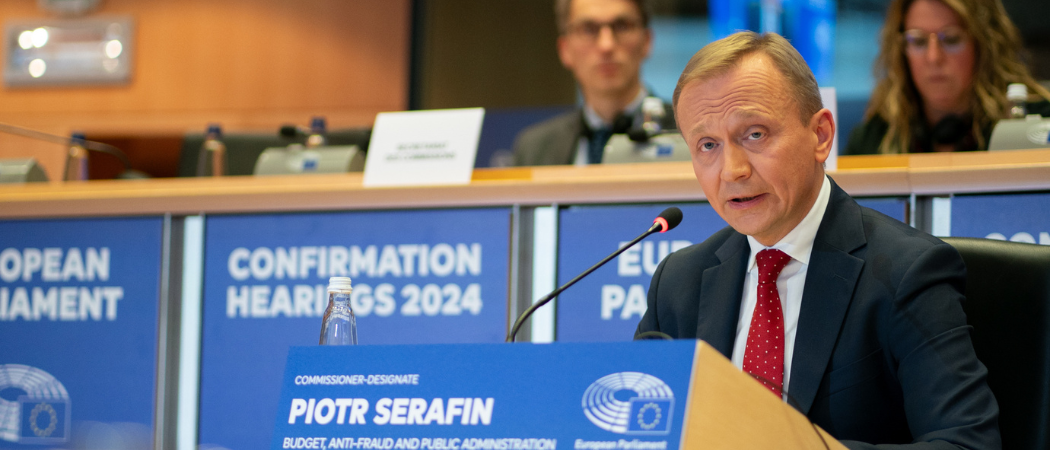Piotr Serafin says the next EU budget should include fewer programmes, but avoids commenting on its precise structure or size

Piotr Serafin, Commissioner-designate for budget, anti-fraud and public administration. Photo credits: European Union
Piotr Serafin, Commissioner-designate for budget, anti-fraud and public administration, has played down rumours circulating in Brussels and denied reports the Commission is planning a complete overhaul of the EU budget, but said there should be fewer funds and these should be linked to national reforms.
Serafin was approved by political groups after his hearing in the European Parliament’s budget committee on Thursday, during which Siegfried Mureşan, co-rapporteur for the next Multiannual Financial Framework (MFF), was first to quiz the Polish politician about his plans for the 2028-2034 budget.
“[Do] you believe in a single RRF-type programme, or [do] you believe that the current programmes of the Union have to continue in the current or in a similar form?” Mureşan asked.
He was referring to reports that under the next EU budget, nationally managed funds like cohesion and agriculture could be consolidated into a single pot of money for each member state, conditional on national reforms and investment, similar to the Recovery and Resilience Facility (RRF), the EU’s €724 billion pandemic recovery fund.
A memo leaked last month suggested all research and innovation funds, which are managed by Brussels, could also be subsumed into a single European Competitiveness Fund.
“Up until now there is no proposal of the European Commission for the future MFF,” Serafin said during a confident showing. “Whatever you have read in the press, it is not the proposal of the Commission for the next MFF.”
President Ursula von der Leyen has promised to propose a new Competitiveness Fund to support strategic sectors such as artificial intelligence, clean tech and biotech.
The Commission is still debating the form this fund will take, Serafin said, but the Strategic Technologies for Europe Platform (STEP) launched earlier this year provides a glimpse of what could be expected.
Two things are certain: the Commission will be hoping to multiply STEP’s €1.5 billion budget many times over, and R&I will be at the heart of the new fund.
“We should build on our strength: an efficient research and development sector. What remains a weakness is the transition from research to the real economy, especially in strategic sectors critical for competitiveness,” Serafin said.
“The new technological revolution is already changing the face of the global economy, from AI to biotechnology, and Europe cannot remain a mere spectator.”
Asked by the other MFF co-rapporteur, Portuguese MEP Carla Tavares, how the Competitiveness Fund will be financed, Serafin said, “There is no clear answer at this point.” STEP, which aims to direct funds from existing programmes to strategic technologies, will act as a “training ground” for the future fund.
Bigger budget
The European research community has stressed the need for additional investment amid fears of American disengagement from defence and climate commitments following the election of Donald Trump, and members of the budget committee also pressed the commissioner-designate on the need for extra financing.
Serafin would not be drawn into speculating on figures, but he did share his opinion that it is “not feasible” to meet the challenges facing the EU with the current size of the MFF, around 1% of Europe’s GDP.
The next long-term budget “must be a strong political statement that Europe is taking more responsibility for its own future,” he told MEPs.
The question of R&I spending will be intrinsically linked to the MFF negotiations. In its report published last month, the expert group advising the Commission on the future of R&I policy recommended the budget for the next Framework Programme should be more than doubled to at least €220 billion, and the group’s chair Manuel Heitor has warned stakeholders to prepare for “a brutal political fight”.
One of Serafin’s jobs will be to secure new one resources, money the Commission is able to raise directly, for example via the Emissions Trading Scheme or reallocated profits of large multinationals, in contrast to member state contributions. The Commission expects these to bring in an additional €36 billion per year from 2028.
The Commission, Council and Parliament agreed in 2020 to work towards new own resources, but progress has been insufficient, Serafin said. He plans to “exert maximum pressure on the Council” to respect that agreement starting next year.
That doesn’t mean the Polish politician has given up hope of increasing member state contributions.
“I will do my best to convince member states that when it comes to some new priorities we talk about, like defence, like competitiveness, it makes much more sense from the perspective of the finance ministers to spend money at the EU level rather than the national level,” he said.
“Spending on defence all around Europe will increase, that’s the historical necessity […] Now, the question is whether part of it can be done through the EU budget.”
In response to multiple questions about balancing traditional priorities with the new focus on competitiveness and defence, Serafin said the EU should not forget about the green transition or about cohesion funding,
He was also clear about the fact the EU budget and even national budgets will not provide the €800 billion annual investment needs identified in the Draghi report. Mobilising private and institutional capital will be key.
The Commission is planning a simplified and more flexible budget, containing fewer programmes and more focused on policy priorities. A simpler budget primarily means simpler for its beneficiaries, Serafin said. “Accessing EU funds does not have to be a bureaucratic nightmare”.
More flexibility will also provide added importance to annual budget negotiations, he said. “These days, we have the MFF, which constraints completely both co-legislators and does not allow the EU to react to the changing priorities.”
Policy-based funding
While the shape of the future MFF is uncertain, the Commission has been clear in wanting to make funding conditional on performance, which was a source of concern among MEPs.
In her mission letter to Serafin, von der Leyen said the next MFF should be “policy-based” not “programme-based”, with “a plan for each country linking key reforms with investments”.
According to Serafin, there is growing awareness in the Commission that “the RRF in its current form cannot be replicated”, because of issues with transparency concerning the final beneficiaries of the money, and a lack of oversight by the European Parliament.
He reassured MEPs the plans would be developed in partnership with capitals and regions. “The RRF approach did not take sufficient account of the regional dimension.”
MEPs also pressed the commissioner-designate repeatedly on the EU’s conditionality regulation, which means payment of EU funds can be suspended to countries which do not respect the rule of law. This has resulted in 21 universities in Hungary being cut off from EU funding under Horizon Europe and Erasmus+.
“We need to apply the conditionality regulation to the letter,” Serafin said, adding that this is applied not because of political views but when EU taxpayers’ money is at risk.
Serafin is a seasoned Brussels operator, having previously served as deputy head of cabinet for former Budget Commissioner Janusz Lewandowski, and head of cabinet for Donald Tusk when he was President of the European Council.
On Thursday, members of the budget committee discussed some of the themes that could shape the next MFF with experts, including ways to integrate policy priorities in the budget and to link funding to performance.
The Commission is due to present its proposal for the next MFF in the first half of 2025, ahead of difficult negotiations which could last up to two years.





 A unique international forum for public research organisations and companies to connect their external engagement with strategic interests around their R&D system.
A unique international forum for public research organisations and companies to connect their external engagement with strategic interests around their R&D system.